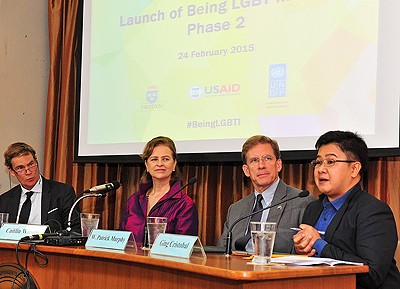
For Immediate Release
BANGKOK, February 24, 2015 – The embassies of Sweden and the United States to Thailand, along with the U.S. Agency for International Development (USAID) and the UN Development Programme (UNDP), launched a $8 million regional project to help safeguard the rights of lesbian, gay, bisexual, transgender and intersex (LGBTI) people in Southeast and East Asia in Bangkok today.
The ‘Being LGBT in Asia – Phase 2’ project will seek to strengthen and empower LGBTI regional civil society advocacy groups and community networks in China, Indonesia, the Philippines and Thailand.
“An active civil society will likely further necessary progressive social and legal change that will advance LGBT peoples’ rights, health and well-being,” said Klas Molin, Swedish Ambassador to Thailand. “All citizens have a right to be treated equally in society, irrespective of their sexual orientation or gender identity.”
With funding from UNDP and USAID, the first phase of the ‘Being LGBT in Asia’ initiative resulted in an increased understanding of human rights issues and social environments encountered by LGBTI people and organizations in Asia.
Conducted through national dialogues and interviews among LGBTI communities—including over 650 people and 220 organizations—the initiative highlighted the challenges facing LGBTI people and organizations and raised awareness about their rights. It also supported emerging community networks, the use of mobile technology in sharing experiences, a knowledge database and information products.
‘Being LGBT in Asia’ country reports are now available for Cambodia, China, Indonesia, Mongolia, Nepal, the Philippines, Thailand and Vietnam in English and local languages.
"Discrimination and stigma affect every aspect of LGBT people's lives," said W. Patrick Murphy, U.S. Embassy Chargé d'affaires. "Joining with our partners, we have the duty and privilege to support LGBT communities as they lead efforts to improve conditions, secure their rights and contribute importantly to society."
Among the findings was evidence that high levels of stigma and discrimination persist in families, workplaces and social sectors, such as health and education. Programme activities in the new phase will help equip LGBTI civil society organizations to effectively advocate with national institutions to address these key issues.
“The importance of public laws, policies and programmes that are inclusive of all populations, including vulnerable groups such as LGBTI people, cannot be stressed enough,” said Caitlin Wiesen, Chief, Regional Policy and Programme for Asia and the Pacific, UNDP. “In Asia and the Pacific, LGBTI people are routinely stigmatized by society and often subject to discrimination and violence, this includes limited access to employment and education opportunities, as well as barriers to accessing health and social protection services.”
LGBTI people are further marginalized in many countries through legal, policy and social frameworks that cast them as criminals or deviants. There is a critical need to overcome stigma, discrimination, punitive laws and poor access to health and social protection services. This urgency is made clear by the rapid and devastating spread of HIV among men who have sex with men and transgender women.
“LGBTI people in Asia are often subjected to discrimination and violence, including being stigmatized by medical practitioners and health institutions. This makes it hard for us to access health services – including HIV prevention and treatment – and we are subjected to discrimination and violence,” said Ging Cristobal, the Regional Programme Coordinator for the International Gay and Lesbian Human Rights Commission and member of the ‘Being LGBT in Asia’ Technical Advisory Group.
The second phase of the project will work closely with community based organizations and national human rights institutions to strengthen their capacity to advocate effectively and implement sensitization trainings with members of national judiciaries and lawmakers and local government units. It will also engage the private sector through regional research and consultations on sexual orientation and gender identity issues in the workplace.
This week the ‘Being LGBT in Asia’ Project will partner with the Asia Pacific Forum of National Human Rights Institutions (APF) to host the ‘Workshop on the Role of National Human Rights Institutions in Promoting and Protecting the Rights and Health of LGBTI in Asia and the Pacific’ on February 24-25, 2015.
In addition, ‘Being LGBT in Asia’ will also bring together some 200 civil society, government and human rights experts and academics to participate in the ‘Regional Dialogue on LGBTI Human Rights and Health in Asia-Pacific’ on February 26-27, 2015, at the UN Conference Centre.







Comment
Make a general inquiry or suggest an improvement.